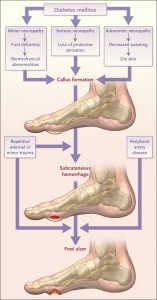Do people with Diabetes have to wear special shoes?
The answer is a simple : YES
The reason to wear special shoes
People with diabetes may develop “Peripheral Neuropathy” in the feet (can also appear in the hands), due to high blood sugar levels. As mentioned in a previous article this may bring about nerve damage which can desensitise the feet in some areas and heighten sensitivity in other areas. Remember numb toes can’t talk and no message goes to the brain alerting the owner that blisters or hot spots are developing. Blisters or hot spots can lead to ulcers and in worse case scenarios may lead to amputations.
The special with this shoes
Special shoes in the sense that they must support the arches, ankles and heels.
They must
– be seam free to avoid rubbing
– have a higher toe box and give wiggle room to the toes
– be made from suitable materials
So while the shoes may not be the most fashionable they will be the most suitable. We will endeavour to accommodate requests regarding styles, depending on the condition of the feet as presented.
How to get suitable diabetic footwear
Following a full examination of the feet, a biomechanical analysis of pelvic and hip control, gait analysis and a foot pressure scan, we will advise on the best style of shoes. In all cases you will require special made to measure orthotics. The shoes may be modular shoes or made to measure bespoke shoes. That choice is at the discretion of the wearer, in all cases.
We will ensure that the shoes are the correct fit.
The orthotics are custom made, the materials used are best suited.
The overall combination will result in the best product, to assist in you maintaining your mobility.
For further information please contact : contact@pedorthist.ie or
01 4434409/045 866887



